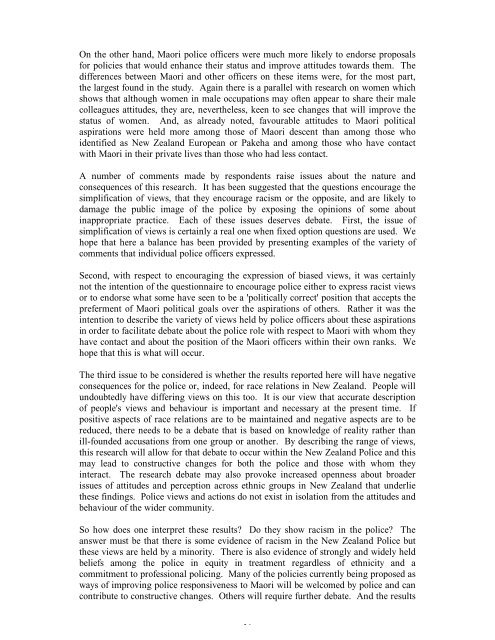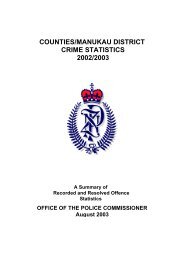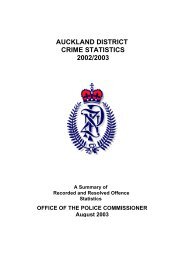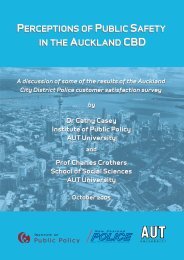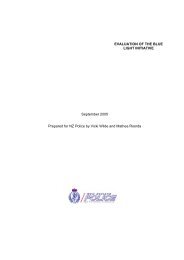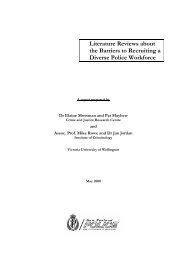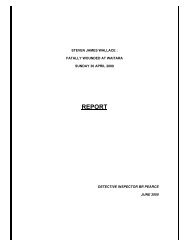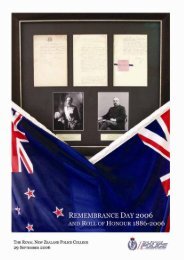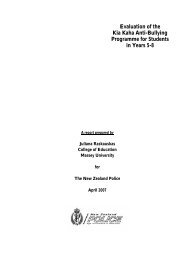Police Perceptions of Maori - Rethinking Crime and Punishment
Police Perceptions of Maori - Rethinking Crime and Punishment
Police Perceptions of Maori - Rethinking Crime and Punishment
You also want an ePaper? Increase the reach of your titles
YUMPU automatically turns print PDFs into web optimized ePapers that Google loves.
On the other h<strong>and</strong>, <strong>Maori</strong> police <strong>of</strong>ficers were much more likely to endorse proposals<br />
for policies that would enhance their status <strong>and</strong> improve attitudes towards them. The<br />
differences between <strong>Maori</strong> <strong>and</strong> other <strong>of</strong>ficers on these items were, for the most part,<br />
the largest found in the study. Again there is a parallel with research on women which<br />
shows that although women in male occupations may <strong>of</strong>ten appear to share their male<br />
colleagues attitudes, they are, nevertheless, keen to see changes that will improve the<br />
status <strong>of</strong> women. And, as already noted, favourable attitudes to <strong>Maori</strong> political<br />
aspirations were held more among those <strong>of</strong> <strong>Maori</strong> descent than among those who<br />
identified as New Zeal<strong>and</strong> European or Pakeha <strong>and</strong> among those who have contact<br />
with <strong>Maori</strong> in their private lives than those who had less contact.<br />
A number <strong>of</strong> comments made by respondents raise issues about the nature <strong>and</strong><br />
consequences <strong>of</strong> this research. It has been suggested that the questions encourage the<br />
simplification <strong>of</strong> views, that they encourage racism or the opposite, <strong>and</strong> are likely to<br />
damage the public image <strong>of</strong> the police by exposing the opinions <strong>of</strong> some about<br />
inappropriate practice. Each <strong>of</strong> these issues deserves debate. First, the issue <strong>of</strong><br />
simplification <strong>of</strong> views is certainly a real one when fixed option questions are used. We<br />
hope that here a balance has been provided by presenting examples <strong>of</strong> the variety <strong>of</strong><br />
comments that individual police <strong>of</strong>ficers expressed.<br />
Second, with respect to encouraging the expression <strong>of</strong> biased views, it was certainly<br />
not the intention <strong>of</strong> the questionnaire to encourage police either to express racist views<br />
or to endorse what some have seen to be a 'politically correct' position that accepts the<br />
preferment <strong>of</strong> <strong>Maori</strong> political goals over the aspirations <strong>of</strong> others. Rather it was the<br />
intention to describe the variety <strong>of</strong> views held by police <strong>of</strong>ficers about these aspirations<br />
in order to facilitate debate about the police role with respect to <strong>Maori</strong> with whom they<br />
have contact <strong>and</strong> about the position <strong>of</strong> the <strong>Maori</strong> <strong>of</strong>ficers within their own ranks. We<br />
hope that this is what will occur.<br />
The third issue to be considered is whether the results reported here will have negative<br />
consequences for the police or, indeed, for race relations in New Zeal<strong>and</strong>. People will<br />
undoubtedly have differing views on this too. It is our view that accurate description<br />
<strong>of</strong> people's views <strong>and</strong> behaviour is important <strong>and</strong> necessary at the present time. If<br />
positive aspects <strong>of</strong> race relations are to be maintained <strong>and</strong> negative aspects are to be<br />
reduced, there needs to be a debate that is based on knowledge <strong>of</strong> reality rather than<br />
ill-founded accusations from one group or another. By describing the range <strong>of</strong> views,<br />
this research will allow for that debate to occur within the New Zeal<strong>and</strong> <strong>Police</strong> <strong>and</strong> this<br />
may lead to constructive changes for both the police <strong>and</strong> those with whom they<br />
interact. The research debate may also provoke increased openness about broader<br />
issues <strong>of</strong> attitudes <strong>and</strong> perception across ethnic groups in New Zeal<strong>and</strong> that underlie<br />
these findings. <strong>Police</strong> views <strong>and</strong> actions do not exist in isolation from the attitudes <strong>and</strong><br />
behaviour <strong>of</strong> the wider community.<br />
So how does one interpret these results? Do they show racism in the police? The<br />
answer must be that there is some evidence <strong>of</strong> racism in the New Zeal<strong>and</strong> <strong>Police</strong> but<br />
these views are held by a minority. There is also evidence <strong>of</strong> strongly <strong>and</strong> widely held<br />
beliefs among the police in equity in treatment regardless <strong>of</strong> ethnicity <strong>and</strong> a<br />
commitment to pr<strong>of</strong>essional policing. Many <strong>of</strong> the policies currently being proposed as<br />
ways <strong>of</strong> improving police responsiveness to <strong>Maori</strong> will be welcomed by police <strong>and</strong> can<br />
contribute to constructive changes. Others will require further debate. And the results<br />
36


